Francesco La Vecchia (born September 10, 1954) is an Italian classical conductor.
Francesco La Vecchia (born September 10, 1954) is an Italian classical conductor.
La Vecchia was born in Rome, and began studying music with his grandfather, who taught him theory, harmony and composition. His first instrument was the classical guitar. [1] He gave his first performance at age 9, and continued studying with Alirio Diaz. In 1972, he founded the Boccherini Quintet, and played hundreds of concerts with this ensemble in Europe, America and Asia.
In 1978, La Vecchia founded the Accademia Internazionale di Musica Arts Academy. In 1982 he began his career as conductor, and was named Permanent Conductor of the Symphonic Institution of Rome. Since then, La Vecchia has conducted more than one hundred orchestras around the world.
In 1993 La Vecchia founded the New World Young Orchestra in Latin America. In 2001 he was made Director of the Professional Training Course for Orchestral Conductor Professors, and at this time launched the Ottorino Respighi Youth Orchestra. In 2002 he was named artistic and musical director of the Orchestra Sinfonica di Roma, and in 2009 he was named Principal Guest Conductor of the Berliner Symphoniker Orchestra.
Specializing in Italian music, La Vecchia has made dozens of recordings, including the first complete orchestral works of Alfredo Casella and those of Giuseppe Martucci (that was previously recorded by M° Francesco d'Avalos with the Philarmonia Orchestra), both for the Naxos label. He has also recorded the works of Franco Ferrara.
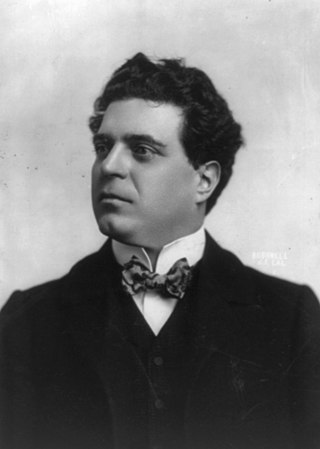
Pietro Mascagni was an Italian composer primarily known for his operas. His 1890 masterpiece Cavalleria rusticana caused one of the greatest sensations in opera history and single-handedly ushered in the Verismo movement in Italian dramatic music. While it was often held that Mascagni, like Ruggero Leoncavallo, was a "one-opera man" who could never repeat his first success, L'amico Fritz and Iris have remained in the repertoire in Europe since their premieres.
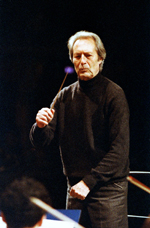
Carlo Maria Giulini was an Italian conductor. From the age of five, when he began to play the violin, Giulini's musical education was expanded when he began to study at Italy's foremost conservatory, the Conservatorio Santa Cecilia in Rome at the age of 16. Initially, he studied the viola and conducting; then, following an audition, he won a place in the Orchestra dell'Accademia Nazionale di Santa Cecilia.

Enrique Bátiz Campbell is a Mexican conductor and concert pianist.

Ottorino Respighi was an Italian composer, violinist, teacher, and musicologist and one of the leading Italian composers of the early 20th century. His compositions range over operas, ballets, orchestral suites, choral songs, chamber music, and transcriptions of Italian compositions of the 16th–18th centuries, but his best known and most performed works are his three orchestral tone poems which brought him international fame: Fountains of Rome (1916), Pines of Rome (1924), and Roman Festivals (1928).

Gian Francesco Malipiero was an Italian composer, musicologist, music teacher and editor.
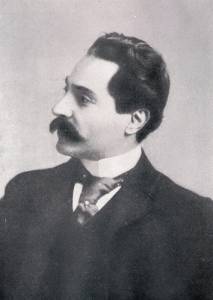
Giuseppe Martucci was an Italian composer, conductor, pianist and teacher. Sometimes called "the Italian Brahms", Martucci was notable among Italian composers of the era in that he dedicated his entire career to absolute music, and wrote no operas. As a composer and teacher he was influential in reviving Italian interest in non-operatic music. Nevertheless, as a conductor, he did help to introduce Wagner's operas to Italy and also gave important early concerts of English music there.

Victor de Sabata was an Italian conductor and composer. He is widely recognized as one of the most distinguished operatic conductors of the twentieth century, especially for his Verdi, Puccini and Wagner.

Gianluigi Gelmetti OMRI, was an Italian-Monégasque conductor and composer.
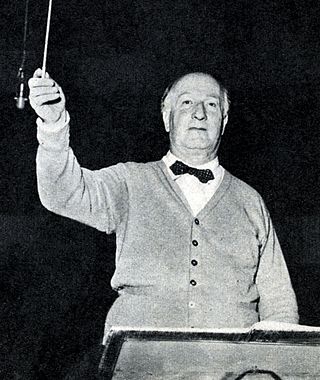
Vittorio Gui was an Italian conductor, composer, musicologist and critic.
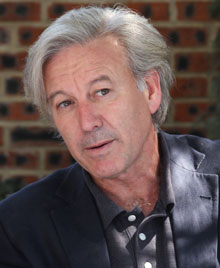
Angel Gil-Ordóñez is a Spanish-born American conductor who co-founded the PostClassical Ensemble with music historian Joseph Horowitz and serves as its Music Director. He is also the Principal Guest Conductor of New York’s Perspectives Ensemble and the Music Director of the Georgetown University Orchestra in Washington, D.C. Additionally, he serves as advisor for education and programming for Trinitate Philharmonia, a program in Mexico modeled on Venezuela’s El Sistema, and is also a regular guest conductor at the Bowdoin International Music Festival in Maine.
Kristiyan Koev is a Bulgarian flutist. Maestro Koev is also known as "Kristiyan Koev – The Golden Flute".

Alberto Zedda was an Italian conductor and musicologist whose specialty was the 19th-century Italian repertoire.

Marzio Conti is an Italian conductor and flautist.
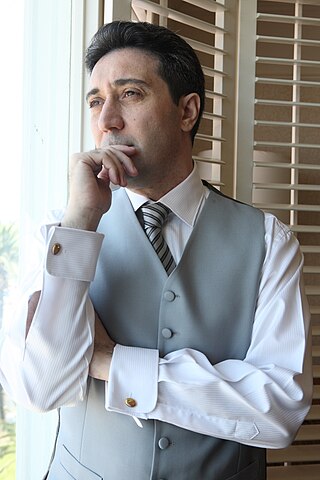
Salvatore Di Vittorio is an Italian composer and conductor. He is music director and Conductor of the Chamber Orchestra of New York. He has been recognized by Luigi Verdi as a "lyrical musical spirit, respectful of the ancient Italian tradition… an emerging leading interpreter of the music of Ottorino Respighi".
The Violin Concerto in A major, P. 49, is the first violin concerto by the Italian composer Ottorino Respighi, which he abandoned in 1903. In 2009, Salvatore Di Vittorio completed it.
Chamber Orchestra of New York is a professional orchestra founded by Italian composer and conductor Salvatore Di Vittorio. It was established on March 27, 2006, on the 250th anniversary of the birth of Wolfgang Amadeus Mozart, with its debut concert on October 11, 2007 at Carnegie Hall's Zankel Hall.
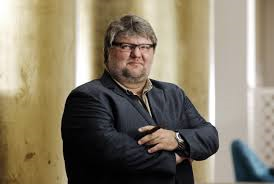
Dmitry Albertovich Yablonsky is a Russian classical cellist and conductor, who was educated at the Juilliard School of Music and Yale University.
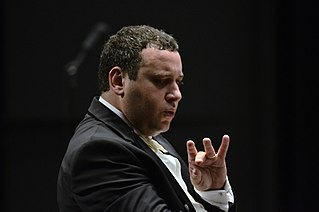
Antonino Fogliani is an Italian conductor.

Vittorio Parisi is an Italian conductor and teacher.

Scott Yoo is an American conductor and violinist. He was appointed Chief Conductor and Artistic Director of the Mexico City Philharmonic Orchestra in 2016. He hosts the PBS TV series Now Hear This.